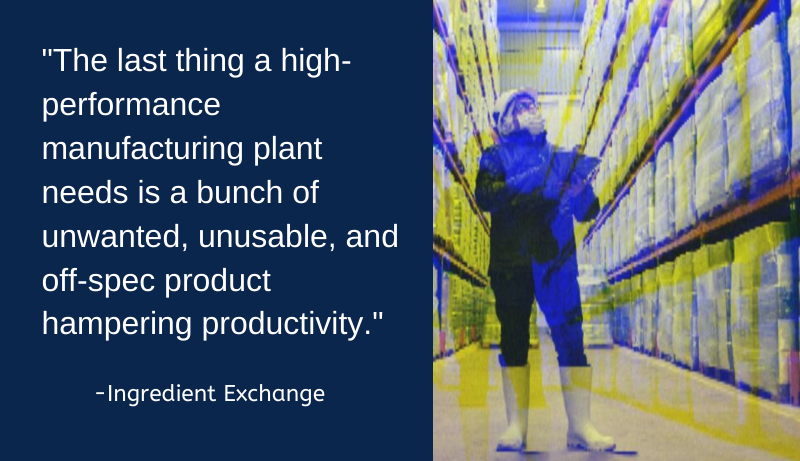As anyone in bulk-ingredient manufacturing knows, inventory accumulation is a nagging issue–one that can test the most squared-away plant manager.
For the internal contact person assigned to manage off-spec inventory, the surplus product creates an ongoing challenge.
They might rely on in-house tactics for clearing out the problem ingredients, including putting it on a bid list, trying to reprocess it, or calling other manufacturers to buy it.
One thing’s for sure: tackling the off-spec stockpile takes time and money.
That’s where outsourcing your surplus-inventory management comes in.
Here are four excess-inventory problems you might recognize and outsourcing options to help you conquer your off-spec ingredients.
Problem 1: Inventory owners don’t see the problem coming
Ingredient manufacturers that expect a regular inventory defect-rate face the challenge of product accumulation.
At some point, someone has to take care of the excess product.
Whether it’s the supply-chain manager or QA officer who gets the task, the excess inventory catches people off-guard.
More importantly, they have to find a way to handle the compounding surplus product.
Establishing a relationship with an ingredient specialist provides a go-to resource for keeping ahead of the problem food. They can integrate into every level of the supply chain and take the hard-to-sell off-specification ingredients off your hands.
Problem 2: Inventory loses value rapidly
The moment a product enters the warehouse, the value-erosion clock kicks in. As time passes and inventory piles up, the opportunity to recoup cash on the product diminishes.
The sooner you can get the wheels turning to sell the product, the more likely you are to salvage extra cash.
However, if handled in-house, the process takes time and resources.
Employees spend working hours assessing the product’s market value, finding a buyer, and coordinating the logistics and verification documentation.
Conversely, a third-party inventory specialist scrutinizes the market. They also have the necessary resources to find a buyer quickly and manage each step of the selling process efficiently.
They can also work with different qualities of product, including expired ingredients, to recoup as much as possible on an otherwise landfill-bound product.
Problem 3: Excess product stresses the organization
For large companies, the off-specification ingredients can create a departmental “hot potato” problem.
Sales teams might see the surplus ingredients as a manufacturing problem. The manufacturing team might argue that it’s the sales team’s responsibility to minimize the excess product’s impact on the company’s bottom line.
At the end of the day, the salesperson has little desire to work on an item that does nothing to move the needle on their quotas or pocketbook.
Furthermore, the inventory stress can cause paralysis–where nothing happens until, of course, the problem gets too big to ignore.
Turning to a trusted ingredient specialist to manage the excess inventory takes the burden off personnel.
Moreover, sales, production, and management teams can focus on their responsibilities without worrying about how the problem ingredients will impact their P&L.
Problem 4: Surplus inventory expenses chip away at the bottom line
A problem product not only gets expensive as it inches toward expiration dates but managing it soaks up employees’ time.
It also creates other expenses along the way.
As the excess inventory accumulates, it ties up valuable storage space and clogs the supply chain.
Additionally, the longer the unwanted product sits, the more it chokes off cash flow–money that could flow into profitable production.
Working with an ingredient management team allows you to reduce your ingredient-storage overhead. With their help, you free up valuable warehouse space and equipment (such as silos and storage tanks).
Plus, they take care of the entire selling process–from finding the right market-fit to overcoming logistics challenges.
Put an end to the inventory accumulation drain
The last thing a high-performance manufacturing plant needs is a bunch of unwanted, unusable, and off-spec product hampering productivity and eating into profits.
Partnering with a trusted inventory specialist takes the hassle out of managing the unwanted product. They’ll also adhere to NDAs and maintain transparency throughout the selling process. Plus, they can tap into their vast network to tailor a solution to fit your business needs.
At Ingredient Exchange, we help ingredient manufacturers reduce the unnecessary expense of storing surplus inventory. We provide a dedicated team to manage and sell the stock, so your teams can focus on their most profitable work.
GIVE US A CALL TODAY: 314-872-8850
IMAGE (EDITED): Mauricio Gutiérrez
